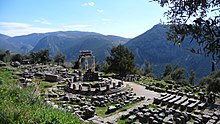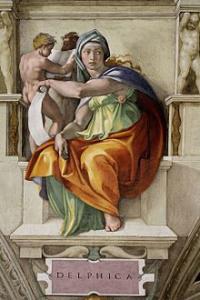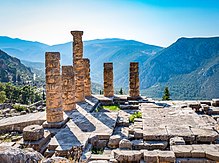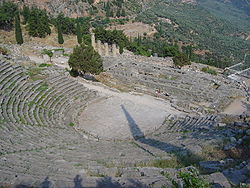 I have always loved Greece. It has been described as one of the world’s largest outdoor archaeological sites. Nearly every bend in the road and every trek up a hill or mountain lead to an ancient significant place of one sort or another. I have been fortunate in my life to go to this fabulous country several times, and each time I find some new spot to delight my historical senses. From Cape Sunion and its wonderful temple in the far south, the location from which ancient sailors first saw their homeland as they approached from the Mediterranean, to Meteora in the far north, were medieval monks survived the rigors of weather and bandits by building monasteries on the very tops of weird granite pillars, thrust up from the plains all round, from Mycenae in the far west, the so-called palace of Agamemnon, to Thessaloniki in the east, Greece presents lavish wonders to energize and titillate the most jaundiced traveller.
I have always loved Greece. It has been described as one of the world’s largest outdoor archaeological sites. Nearly every bend in the road and every trek up a hill or mountain lead to an ancient significant place of one sort or another. I have been fortunate in my life to go to this fabulous country several times, and each time I find some new spot to delight my historical senses. From Cape Sunion and its wonderful temple in the far south, the location from which ancient sailors first saw their homeland as they approached from the Mediterranean, to Meteora in the far north, were medieval monks survived the rigors of weather and bandits by building monasteries on the very tops of weird granite pillars, thrust up from the plains all round, from Mycenae in the far west, the so-called palace of Agamemnon, to Thessaloniki in the east, Greece presents lavish wonders to energize and titillate the most jaundiced traveller.
I adore all of these places, and they do not even begin to exhaust the magic of the islands, from Santorini to Crete to Delos. I would never tire of Greece, but I imagine the place that holds my memory and captures my imagination most is Delphi, the site of the famous oracle where more than a few ancient leaders have had their fates determined and/or undermined by the Pythia, a long line of female oracles who majored in wisdom, and, I imagine, in more than a few cases gross trickery. The Pythian priestess, by tradition a local woman of exceptional virtue, sat on a three-legged stool over an open chasm near a cave, and answered questions from leaders from across the known world. It has long been conjectured that the trances out of which the women spoke their often abstruse answers were caused by the vapors that arose from that crack in the earth. What those vapors were in fact is the source of long debate. Suggestions include: methane or ethane, and even cannabis has been opined. One is hardly likely ever to know for certain.
What is most intriguing to me about the shrine is its extraordinary longevity and its quite vast influence; the oracle lasted for nearly 1800 years, not losing its influence until the rise of Christianity. The shrine’s workings seemed to be as follows: the question was asked, something like “Will I triumph over my enemies?”, the Pythia would reply, usually in rather obscure phrases, and in turn those obscure oracles would be interpreted by a group of priests attached to the shrine. As anyone can surmise, the distance between oracle and interpretation too often depended on the power and generosity of the questioner. That is to say, the real power of the shrine was to be found in the interpretations of the priests rather than in the odd utterances of the oracle. Yet, it was surely to the advantage of the oracle that it sometimes remain obscure; that way it could yield multiple interpretations, one of which might suit the powerful questioner, thus making possible more money for the services of the Pythia and a longer life for the shrine itself. And if the oracle was misinterpreted by the questioner, well, the oracle could not be accused of the confusion since other interpretations were always possible.
There are many famous examples of questioners of the Pythia, and among those was a query from the famous king Croesus who in 560BCE asked whether his own kingship and dynasty would last for centuries. The reply was: “Whenever a mule shall become sovereign king of the Medians, then, O Croesus, flee for the mountains, flee!” Croesus took this oracle as proof positive that his reign and those of his heirs over Lydia would be a long one, since it was not possible that a mule would ever rule any country. Unfortunately for him, he either forgot or did not know that Cyrus, the one who defeated Lydia, was half-Mede and half-Persian, and hence a sort of human mule. Many other examples can be found in the literature of the Greeks.
I find all this instructive for modern biblical interpretation. I have spent my entire scholarly life attempting to offer what I consider faithful interpretations of biblical texts. I have shared many of those interpretations with countless students, both in schools and outside of them, in churches and conferences. In short, I am among the priests of Delphi, listening carefully to the oracles written by the faithful scribes of the past, and passing on meanings as I hear them to the questioners of this day. Though I hope I am not unduly influenced by the power and wealth of the questioners, or, in my case, those who have invited me to speak or who pay my salary, I cannot deny that I have been so influenced in my career, having been unwilling through fear of personal or institutional rejection to speak the fullest truth that I have discerned.
I dare say that I am hardly alone in this concern. One of the most controversial activities in Islam has been the struggle between the words of the Qur’an, believed to have been dictated directly from the archangel Gabriel into the ears of the prophet Mohammed, and the hadith of that prophet, that is the oral tradition that seeks to interpret those first words for a new day. Indeed, all religions are tasked to interpret original oracles for changing times, and among those interpretations one is always going to find sharp differences of opinion, differences that lead to anger, frustration, and soon various schools, each claiming the genuine and true succession of the originals.
Though the origins of the Delphic oracle may go back to 1400BCE, and though its influence persisted through the rise and hegemony of Christianity in the 5th century CE, its influence lasted so long because its often obscure dicta were interpreted, sometimes faithfully and sometimes for personal or institutional gain, by professional holy ones who arrogated to themselves the power to interpret. In my life, I have done precisely the same thing, taking for myself the power to interpret the sacred writings of a book holy to two billion modern Christians. Though the biblical writers did not claim access to secret wisdom influenced by hallucinogenic vapors (though the wild prose of John’s Revelation or the vivid poetry of the prophet Ezekiel sound as if created under some sort of drugged-out influences), they did claim that the mysterious Holy Spirit directly caused them to write as they did, thus opening the way for interpreters like me to enter the cavern of their work and to speak what I see and hear there to those who choose to listen.
Delphi remains for me a magical place and yet a familiar one to any who would spend their lives in the work of interpretation. If you have not seen it, I hope you get the chance to go. The Greeks called it the Omphalos, the “navel of the earth,” that is the center of everything. Those ancient interpretive priests began the work that I, and all of you preachers, still perform, however faithfully, however greedily.
(Images from Wikimedia Commons)












